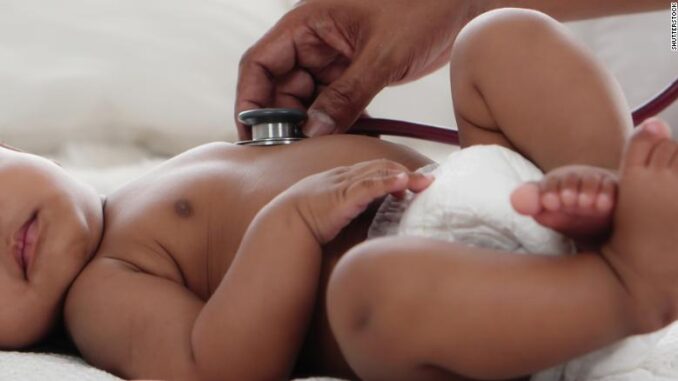
Black newborns are more likely to survive during childbirth when cared for by Black doctors, according to a new study.
In the United States, Black babies die at three times the rate of white newborns during their initial hospital stays, according to a peer-reviewed study published Monday in the Proceedings of the National Academy of Sciences. But when Black doctors cared for Black babies, their mortality rate was cut in half.
While this data doesn’t tell us exactly why this happens, a mix of structural issues could’ve contributed, and “each are really disturbing,” said Brad Greenwood, study co-author and an associate professor of Information Systems & Operations Management Sciences at George Mason University.
“I don’t think any of us would suggest as co-authors that these results are manifesting as a result of malicious bias on the part of physicians,” Greenwood said. “I also think that underscores how insidious something like this is. Children are dying as a result of just structural problems.”
Researchers analyzed 1.8 million hospital birth records in Florida from 1992 to 2015 and identified the race of the doctor. The study found the largest decrease in Black newborn mortality rate occurred in complex births and at hospitals that deliver more Black babies.
The race of the doctor caring for white babies did not make much difference to the likelihood of survival, and there was no statistically significant improvement in maternal mortality – which is also higher for Black women – when mothers were the same race as their doctor.
The stark differences in infant mortality are not the result of a biological difference but rather likely the legacy of structural racism, said study co-author Rachel Hardeman, a reproductive health equity researcher and associate professor at the University of Minnesota. She cited one theory that suggests Black women are less healthy and at greater risk for negative health outcomes during pregnancy because of the cumulative effects of racism and socioeconomic disadvantage over the course of their lives.
He said those effects, including limited access to health care and education, are the same factors behind the disproportionate effect of COVID-19 on people of color.
“We’re talking about a social construct that has gotten under the skin,” she said.
Hardeman said infant mortality rates are often used by researchers as a marker of overall community health and well-being. The U.S. has a higher infant mortality rate than almost all other Organization for Economic Cooperation and Development countries, ranking higher only than Mexico, Turkey and Chile.
Although infant mortality rates overall have been declining for decades in the U.S., severe racial disparities remain. Research published by the Centers for Disease Control and Prevention in 2019 found that Black babies died at double the rate of white, Asian or Hispanic infants before their first birthday, regardless of the mother’s income or education level.
“As an industrialized nation, the fact that we have the infant mortality rates we have, certainly the infant mortality rates that we see based on race and ethnicity, are incredibly concerning,” Hardeman said.
Hardeman said the new study provides the first robust empirical evidence of the problem, and the data may help researchers figure out how to mitigate it.
Both researchers cautioned that the data does not mean only Black doctors should treat Black patients but rather illustrated the need to better educate all doctors on how to treat people of color. Hardeman said increasing diversity in the medical workforce could be one way to create change, noting that about 13% of the U.S. population is Black, but just 5% of doctors are African American, according to the Association of American Medical Colleges.
“It could go a long ways to helping with this, but also we don’t know that the answer is necessarily that we just need more Black doctors,” she said. “We have to be thinking about the health care institutions themselves and how physicians are being trained … to think about the role of race and racism in the clinical encounter but also in people’s lives outside of health care settings.”
Follow N’dea Yancey-Bragg on Twitter: @NdeaYanceyBragg
For more info on the original article: https://www.usatoday.com/story/news/health/2020/08/19/black-babies-more-likely-live-when-treated-black-doctors-study/3389521001/

Be the first to comment